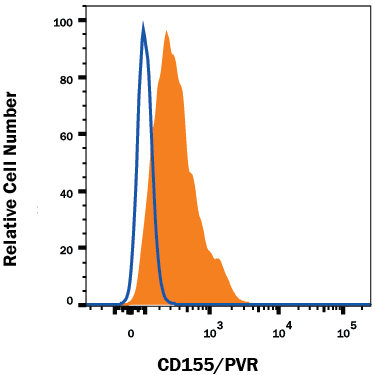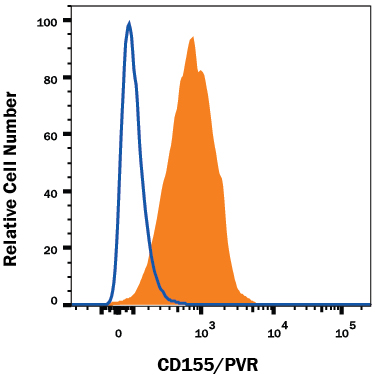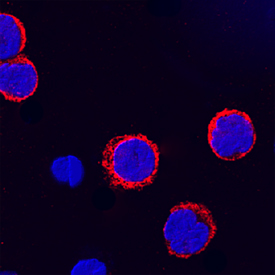Human CD155/PVR Antibody Summary
Applications
Please Note: Optimal dilutions should be determined by each laboratory for each application. General Protocols are available in the Technical Information section on our website.
Scientific Data
 View Larger
View Larger
Detection of CD155/PVR in U937 Human Cell Line by Flow Cytometry. U937 human histiocytic lymphoma cell line was stained with Mouse Anti-Human CD155/PVR Monoclonal Antibody (Catalog # MAB25301, filled histogram) or isotype control antibody (Catalog # MAB002, open histogram), followed by Phycoerythrin-conjugated Anti-Mouse IgG Secondary Antibody (Catalog # F0102B). View our protocol for Staining Membrane-associated Proteins.
 View Larger
View Larger
Detection of CD155/PVR in HUVEC Human Cells by Flow Cytometry. HUVEC human umbilical vein endothelial cells were stained with Mouse Anti-Human CD155/PVR Monoclonal Antibody (Catalog # MAB25301, filled histogram) or isotype control antibody (Catalog # MAB002, open histogram), followed by Allophycocyanin-conjugated Anti-Mouse IgG Secondary Antibody (Catalog # F0101B). View our protocol for Staining Membrane-associated Proteins.
 View Larger
View Larger
CD155/PVR in Human PBMCs. CD155/PVR was detected in immersion fixed human peripheral blood mononuclear cells (PBMCs) using Mouse Anti-Human CD155/PVR Monoclonal Antibody (Catalog # MAB25301) at 15 µg/mL for 3 hours at room temperature. Cells were stained using the NorthernLights™ 557-conjugated Anti-Mouse IgG Secondary Antibody (red; Catalog # NL007) and counterstained with DAPI (blue). Specific staining was localized to cytoplasm and plasma membrane. View our protocol for Fluorescent ICC Staining of Non-adherent Cells.
Reconstitution Calculator
Preparation and Storage
- 12 months from date of receipt, -20 to -70 degreesC as supplied. 1 month, 2 to 8 degreesC under sterile conditions after reconstitution. 6 months, -20 to -70 degreesC under sterile conditions after reconstitution.
Background: CD155/PVR
CD155 [also known as PVR (poliovirus receptor) and Necl-5 (nectin-like molecule-5)] is a 70 kDa type I transmembrane (TM) glycoprotein that is a member of the nectin-like (Necl) family of nectin-related molecules (1). Like nectins, Necl molecules are Ig superfamily members that contain three Ig-like extracellular domains, a TM segment, and a cytoplasmic tail. Unlike nectins, Necl molecules cannot interact with cytoplasmic afadin (1). While Nectins serve as cell adhesion molecules, the actual functions of most Necls are yet-to-be determined. CD155/PVR was originally isolated based on its ability to mediate polio virus attachment to host cells (2, 3). The full-length (or CD155 alpha isoform) is synthesized as a 417 amino acid (aa) precursor that contains a 20 aa signal sequence, a 323 aa extracellular region, a 24 aa TM segment and a 50 aa cytoplasmic tail. The extracellular region contains one N-terminal V-type and two C2-type Ig-like domains (2, 3). The V-type domain mediates polio virus binding (4). Three other isoforms exist, all of which retain the Ig-like domains. CD155δ is transmembrane with a shortened cytoplasmic tail of 25 aa. CD155 beta (352 aa) and CD155 gamma (344 aa) are 60-65 kDa soluble forms that show removal of the TM segment and surrounding amino acids (2, 5). The soluble forms will bind the polio virus (due to the presence of the V-type Ig domain) but afford no protection against polio infection because of low circulating levels (5). CD155 has been demonstrated to bind vitronectin, nectin-3, and DNAM-1 (6-8). DNAM-1 binding promotes monocyte migration and NK cell killing. CD155 is expressed in all normal tissues and is highly expressed in tumor cells of epithelial and neuronal origin.
- Takai, Y. et al. (2003) Cancer Sci. 94:655.
- Mendelsohn, C.L. et al. (1989) Cell 56:855.
- Koike, H. et al. (1990) EMBO J. 9:3217.
- Koike, S. et al. (1991) Proc. Natl. Acad. Sci. USA 88:4104.
- Baury, B. et al. (2003) Biochem. Biophys. Res. Commun. 309:175.
- Mueller, S. and E. Wimmer (2003) J. Biol. Chem. 278:31251.
- Reymond, N. et al. (2004) J. Exp. Med. 199:1331.
- Lange, R. et al. (2001) Virology 285:218.
Product Datasheets
Citations for Human CD155/PVR Antibody
R&D Systems personnel manually curate a database that contains references using R&D Systems products. The data collected includes not only links to publications in PubMed, but also provides information about sample types, species, and experimental conditions.
7
Citations: Showing 1 - 7
Filter your results:
Filter by:
-
CRISPR activation screen identifies BCL-2 proteins and B3GNT2 as drivers of cancer resistance to T cell-mediated cytotoxicity
Authors: J Joung, PC Kirchgatte, A Singh, JH Cho, SP Nety, RC Larson, RK Macrae, R Deasy, YY Tseng, MV Maus, F Zhang
Nature Communications, 2022-03-25;13(1):1606.
Species: Human
Sample Types: Cell Lysates
Applications: Western Blot -
Trabectedin triggers direct and NK-mediated cytotoxicity in multiple myeloma
Authors: M Cucè, ME Gallo Cant, MA Siciliano, C Riillo, D Caracciolo, F Scionti, N Staropoli, V Zuccalà, L Maltese, A Di Vito, K Grillone, V Barbieri, M Arbitrio, MT Di Martino, M Rossi, N Amodio, P Tagliaferr, P Tassone, C Botta
J Hematol Oncol, 2019-03-21;12(1):32.
Species: Human
Sample Types: Whole Cells
Applications: Flow Cytometry -
Binding of the Fap2 protein of Fusobacterium nucleatum to human inhibitory receptor TIGIT protects tumors from immune cell attack.
Authors: Gur C, Ibrahim Y, Isaacson B, Yamin R, Abed J, Gamliel M, Enk J, Bar-On Y, Stanietsky-Kaynan N, Coppenhagen-Glazer S, Shussman N, Almogy G, Cuapio A, Hofer E, Mevorach D, Tabib A, Ortenberg R, Markel G, Miklic K, Jonjic S, Brennan C, Garrett W, Bachrach G, Mandelboim O
Immunity, 2015-02-10;42(2):344-55.
Species: Human
Sample Types: Whole Cells
Applications: IHC -
Mouse TIGIT inhibits NK-cell cytotoxicity upon interaction with PVR.
Authors: Stanietsky N, Rovis T, Glasner A, Seidel E, Tsukerman P, Yamin R, Enk J, Jonjic S, Mandelboim O
Eur J Immunol, 2013-07-04;43(8):2138-50.
Species: Human
Sample Types: Whole Cells
Applications: Flow Cytometry -
Kaposi's sarcoma-associated herpesvirus ORF54/dUTPase downregulates a ligand for the NK activating receptor NKp44.
Authors: Madrid, Alexis S, Ganem, Don
J Virol, 2012-06-06;86(16):8693-704.
Species: Human
Sample Types: Whole Cells
Applications: Flow Cytometry -
Human Herpesvirus 8 (HHV8) sequentially shapes the NK cell repertoire during the course of asymptomatic infection and Kaposi sarcoma.
Authors: Dupuy S, Lambert M, Zucman D, Choukem SP, Tognarelli S, Pages C, Lebbe C, Caillat-Zucman S
PLoS Pathog., 2012-01-12;8(1):e1002486.
Species: Human
Sample Types: Whole Cells
Applications: Flow Cytometry -
Mutations of the von Hippel-Lindau gene confer increased susceptibility to natural killer cells of clear-cell renal cell carcinoma.
Authors: Perier A, Fregni G, Wittnebel S, Gad S, Allard M, Gervois N, Escudier B, Azzarone B, Caignard A
Oncogene, 2011-01-24;30(23):2622-32.
Species: Human
Sample Types: Whole Cells
Applications: Flow Cytometry
FAQs
No product specific FAQs exist for this product, however you may
View all Antibody FAQsReviews for Human CD155/PVR Antibody
Average Rating: 5 (Based on 2 Reviews)
Have you used Human CD155/PVR Antibody?
Submit a review and receive an Amazon gift card.
$25/€18/£15/$25CAN/¥75 Yuan/¥2500 Yen for a review with an image
$10/€7/£6/$10 CAD/¥70 Yuan/¥1110 Yen for a review without an image
Filter by:


